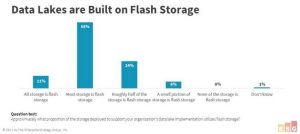Powering Up All-Flash Data Lake With Dell PowerScale F900
Able to scale up to 93PB in one cluster
This is a Press Release edited by StorageNewsletter.com on May 20, 2021 at 2:31 pm Blog written by John Shirley, VP, product management, unstructured data solutions (UDS), Dell Technologies, Inc.
Blog written by John Shirley, VP, product management, unstructured data solutions (UDS), Dell Technologies, Inc.
Why all-flash data lakes, and why now?
Today’s most demanding unstructured data workloads – such as massive graphics and video files, large repositories of analytical, research, genomics, and AI data, electronic design automation for semiconductors, HPC and numerous others – are difficult for many storage systems to handle. Why? They require massive amounts of CPU and GPU processing power and the ability to scale capacity and performance seamlessly.
Data locality, performance, and proven technology are top considerations for AI infrastructure. Companies want their file storage systems to keep pace with the unpredictable demands of a digital business. In fact, recent research from ESG found big data/data lake repositories for unstructured data to be among the top 3 workloads respondents were investing in to keep pace with the demands of a digital business. Unlocking the business potential in data requires file storage to no longer be just big; it must be big, fast, and simple to manage.
Click to enlarge
Another piece of research from ESG shows these requirements are leading to an increase in all-flash data lakes.
That’s why today we’re furthering our decades-long leadership in the unstructured storage arena with the introduction of our powerful node yet – the PowerScale F900.
Powering up all-flash line-up with the F900
The F900, the latest addition to PowerScale all-flash lineup, features dual-socket cascade lake processors, all-NVMe flash and Nvidia GPUDirect compatibility to handle your most data intensive workloads. With this release, you get more power and scale through blazing fast all-NVMe, support for GPU accelerated applications, and the ability to scale up to 93PB in one cluster. It is designed to be the workhorse of modern, performance data lakes.
With this release, the user also get more flexibility and choice for your unstructured storage needs in the edge, core and public cloud. It can add in F900 nodes or replace old nodes with new PowerScale nodes, all while having compatibility with existing Isilon clusters, thanks to the PowerScale OneFS OS.
“We’re excited for the additional power and flexibility made available to us with the latest PowerScale all-flash platform and updates to OneFS. Knowing we can simply swap in the latest gen while the cluster remains online keeps us worry free,” said Keith Bradley, director, IT, Nature Fresh Farms. “With PowerScale all-flash we can support our most demanding data workloads – from new edge use cases, to the core data center, and potential public cloud workloads.“
Additionally, PowerScale all-flash offerings provide options to support both on-premises and public cloud workloads, and you can choose whether to consume the technology as an appliance or as-a-service.
All-flash tier available with PowerScale for Google Cloud
Dell EMC PowerScale for Google Cloud, the scale-out file service which brought performance to Google Cloud, is available with tier-1 Agile configurations. These all-flash deployment options offer a lower entry point with reduced minimum capacities and shorter commitment terms. Right-sized for the opportunity, these configurations enable an easy, hassle-free on-ramp and are a great option if you want to test drive the service.
“We continue to collaborate with Dell Technologies to deliver high value and more deployment options to our customers with Dell EMC PowerScale for Google Cloud, which combines the massive scalability and performance of PowerScale with the economics and innovative native services of Google Cloud,” said Guru Pangal, GM, storage, Google Cloud. “As the only cloud provider to offer an integrated PowerScale offering, our expanded, powerful tier-1 configurations deliver an all-flash performance to organizations looking for shorter commitment terms that can handle demanding file workloads. Our strong relationship with Dell Technologies means that we work side-by-side to deliver integrated, best-in-class storage services, and solutions to our joint customers.“
PowerScale: simple, flexible, and reliable
PowerScale OneFS OS – the power behind our PowerScale nodes – has been proven with customers ranging from three to 252 node clusters, which collectively form a hybrid-cloud enabled, enterprise data lake. Released PowerScale OneFS 9.2 speeds up PowerScale F200 (edge/entry nodes) by 25% and F600 (all-NVMe compact performance nodes) systems by 70% for sequential reads (1). In addition, with the RDMA support for applications and clients with NFS customers benefit from accelerated GPU-powered applications, higher throughput performance and low latency communication, especially for single connection and read intensive workloads.
“Modern AI and data science applications require powerful performance and storage that provides maximum throughput, high bandwidth and low latency from the edge to the data center to the cloud,” said Manuvir Das, head, enterprise computing, Nvidia Corp. “With Nvidia GPUDirect Storage, the Dell PowerScale F900 storage platform enables a broad range of customers across healthcare, financial services, automotive and many more industries to ensure their infrastructure is optimized for AI.“
With PowerScale, the user also get the added benefits that come with company’s ecosystem that includes over 250 ISV partner integrations and certifications across AI, HPC, analytics, backup, data management, safety and security, autonomous driving, and genomics.
“Dell EMC PowerScale is our ultimate file data platform,” said Maurizio Davini, CTO, University of Pisa. “It’s a technology that enables us to build data-driven products and helps us make good decisions with a great return on our investment. The value we get out of PowerScale is truly unmatched.” said Davini shares more on the University’s use of PowerScale to power HPC and AI workloads in his interview with TheCUBE (Video).
(1) Based on internal performance testing performed by Dell EMC for All-flash nodes with OneFS9.2 and OneFS9.1 on Spec ’14 and NFS IOzone benchmarks. Performance varies by cluster and is dependent on workloads. February 2021. Actual results will vary.

















 Subscribe to our free daily newsletter
Subscribe to our free daily newsletter

